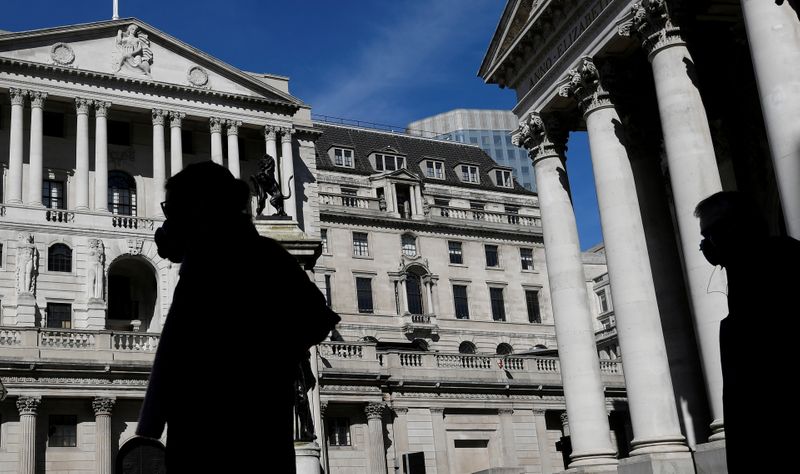By David Milliken and Andy Bruce
LONDON (Reuters) - The Bank of England said Britain could be headed for its biggest economic slump in over 300 years due to the coronavirus lockdown and kept the door open on Thursday for more stimulus next month.
In what it called an 'illustrative scenario' rather than a standard forecast, the BoE said Britain's economy might be on course to shrink by 25% in the three months to June and unemployment could more than double to 9% of the workforce.
In 2020 as a whole, output risked shrinking by 14% - the biggest plunge since a 'Great Frost' in 1709 - despite the huge stimulus provided so far by the BoE's rock-bottom interest rates and mammoth bond-buying programme, as well as the government's 100 billion pound ($124 billion) emergency budget measures.
The central bank's scenario did, however, include a sharp economic bounce-back in 2021 with growth of 15% if lockdown restrictions are loosened over the coming months.
The BoE kept its benchmark interest rate at an all-time low of 0.1% and left its target for bond-buying, most of it British government debt, at 645 billion pounds.
Two of its nine policymakers - Michael Saunders and Jonathan Haskel - voted for a further 100 billion pounds of bond-buying firepower and Governor Andrew Bailey said the BoE was ready to act again.
"There is clearly a commitment and a determination to take action should we need to do so," Bailey told reporters. "I would really leave that strong message with you."
Last week, the U.S. Federal Reserve restated a pledge to keep interest rates low and offer trillions of dollars in credit as long as the economy needs it. The European Central Bank also kept the door open to further stimulus.
Analysts at Nomura said the BoE now held more government bonds as a share of national economic output than its U.S. and European counterparts although it might chose to slow its pace of purchases later this year.
Striking a less gloomy tone than many economists, Bailey said the BoE expected "the recovery of the economy to happen over time, though much more rapidly than the pull-back from the global financial crisis".
After more than six weeks of lockdown, Prime Minister Boris Johnson is due to outline Britain's next steps on Sunday.
Officials have suggested a gradual move towards re-opening businesses, while ministers say that firms operating outdoors might be able to find a way to function in the summer months.
The BoE estimated an extra two weeks of lockdown would cost about 1.25% of GDP in the short term and raise unemployment by 0.75 percentage points, though the longer-term impact would be near zero.
MORE QE IN JUNE?
Many economists expect the BoE to increase its asset purchase programme in June, before the extra 200 billion pounds it gave itself in March is exhausted by the furious pace at which it is buying British government debt.
Some forecasters doubt Britain will bounce back as quickly as the BoE assumes.
"We see this forecast as credible for 2020, but are less convinced by the 2021 recovery, where we take a more cautious view, implying weaker growth, lower inflation, wider deficits and more MPC action," Morgan Stanley (NYSE:MS)'s Jacob Nell said.
The BoE said inflation was likely to fall below 1% in the next few months, half the BoE's target, but that recent figures suggested demand had stabilised, albeit at very low levels.
The BoE also said banks were in a much better position to support households and businesses than during the global financial crisis.
Sterling rose after the central bank's announcement, initially gaining as much as half a cent against the U.S. dollar. British government bonds prices fell slightly.
The BoE acknowledged there were risks that its scenario could prove too optimistic because people might remain cautious about resuming their normal lives after the lockdown.

Workers might be worried about their jobs and companies might also be more risk averse, saving money rather than spending.